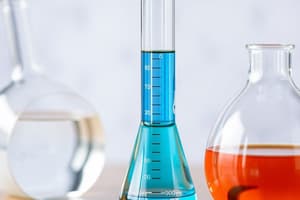Podcast
Questions and Answers
Third graders will learn about solubility, which is the ability of a substance to dissolve in a given ______.
Third graders will learn about solubility, which is the ability of a substance to dissolve in a given ______.
solvent
Hot water can dissolve more sugar than ______ water.
Hot water can dissolve more sugar than ______ water.
cold
Solutions are mixtures of two or more substances that can be separated by physical processes such as ______ or evaporation.
Solutions are mixtures of two or more substances that can be separated by physical processes such as ______ or evaporation.
filtering
Matter can be found in solid, liquid, or ______ states.
Matter can be found in solid, liquid, or ______ states.
Matter can be broken down into smaller particles called ______, which then combine to form molecules.
Matter can be broken down into smaller particles called ______, which then combine to form molecules.
Students can predict whether different substances will dissolve in ______, vinegar, or oil.
Students can predict whether different substances will dissolve in ______, vinegar, or oil.
Water pollution can be caused by solid ______ that falls into water sources.
Water pollution can be caused by solid ______ that falls into water sources.
By understanding the impact of pollution on the environment, students can take actions to reduce waste and ______ in their daily lives.
By understanding the impact of pollution on the environment, students can take actions to reduce waste and ______ in their daily lives.
Students can mix water and food coloring or dissolve salt in water to create colorful ______.
Students can mix water and food coloring or dissolve salt in water to create colorful ______.
Students can participate in clean-up activities, such as picking up trash in their schoolyard or ______.
Students can participate in clean-up activities, such as picking up trash in their schoolyard or ______.
Study Notes
Exploring General Science for Third Graders: Solutions, Matter, and Clean Environments
As third graders embark on their science learning journey, they'll dive into the world of solutions, matter, and clean environments. Let's delve into these subjects and see how they intertwine.
Solutions and Solubility
Solutions are mixtures of two or more substances that can be separated by physical processes such as filtering or evaporation. Third graders will learn about solubility, which is the ability of a substance to dissolve in a given solvent. Some materials dissolve easily, while others don't. For instance, sugar dissolves in water, but a pencil will not. When students learn about solubility, they'll discover that temperature can affect it, too. Hot water can dissolve more sugar than cold water.
Third graders might enjoy conducting simple experiments to demonstrate solubility and solutions, such as mixing water and food coloring to create colorful water solutions or dissolving salt in water to observe the salt disappearing.
Matter and Its Properties
Matter is all around us, and it can be found in solid, liquid, or gas states. Third graders will learn about the properties of matter, such as shape, color, size, and weight. They'll also discover that matter can be broken down into smaller particles called atoms, which then combine to form molecules.
A fun way for third graders to explore the properties of matter is by making slime, which is a non-Newtonian fluid, meaning its viscosity changes depending on how you interact with it. Students can also go on a "treasure hunt" for matter in their classroom, searching for items and discussing their properties.
Keeping the Environment Clean
As third graders learn about solutions, solubility, and matter, they'll also explore how these concepts relate to the environment. Students will be encouraged to explore the importance of keeping our environment clean and develop an understanding of how everyday actions can impact our planet.
Third graders might be surprised to learn that water pollution can be caused by solid matter that falls into water sources. They'll learn that when we throw trash on the ground, it can wash into streams or rivers and harm the environment. By understanding the impact of pollution on the environment, students can take actions to reduce waste and pollution in their daily lives.
Engaging Activities for Third Graders
- Solubility experiments: Students can predict whether different substances will dissolve in water, vinegar, or oil and then test their predictions.
- Matter treasure hunt: Students can search for items in their classroom and discuss their properties.
- Creating solutions: Students can mix water and food coloring or dissolve salt in water to create colorful solutions.
- Slime-making: Students can make slime and explore its non-Newtonian properties.
- Upcycling and recycling: Students can create crafts using recycled materials and learn about the importance of recycling.
- Pollution experiments: Students can conduct experiments to demonstrate how pollution can harm the environment.
- Clean-up activities: Students can participate in clean-up activities, such as picking up trash in their schoolyard or community.
Exploring general science for third graders doesn't have to be boring; by focusing on hands-on activities and engaging with real-world issues, students can have fun while expanding their understanding of the world around them.
Studying That Suits You
Use AI to generate personalized quizzes and flashcards to suit your learning preferences.
Description
Explore solutions, solubility, matter properties, and environmental cleanliness with engaging activities tailored for third graders. From conducting solubility experiments to creating colorful solutions and learning about the impact of pollution, this quiz aims to make science fun and relevant for young learners.




